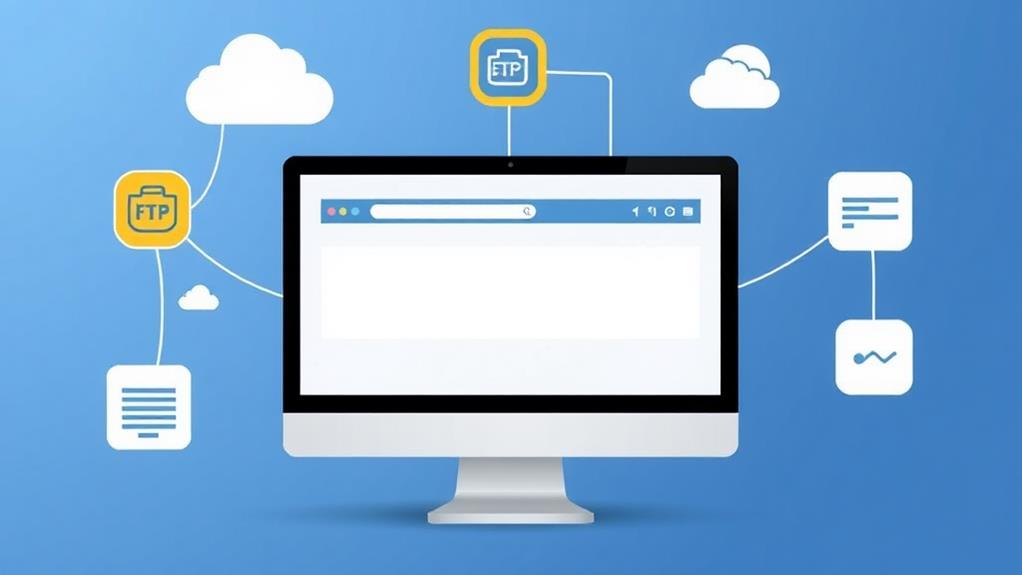In the domain of website hosting, a question often arises: Can one host a website without a domain? The answer may surprise many, as the possibilities extend beyond conventional norms. The concept of forgoing a domain opens up a world of alternatives that offer unique advantages and challenges. By exploring the nuances of hosting without a domain, one can uncover a world where innovation meets practicality, prompting a reconsideration of traditional website hosting norms.
Key Takeaways
- Yes, hosting without a domain is possible using domain-free hosting or IP hosting.
- Free hosting services offer subdomains for website creation without the need for a domain.
- IP hosting allows direct access to a website through its IP address.
- Hosting without a domain can be cost-effective and beneficial for temporary projects.
- Consider SEO impacts, branding challenges, and technical aspects before hosting without a domain.
Overview of Hosting Without Domain
In the world of web hosting, the concept of hosting a website without a domain is a topic that intrigues many. This can be achieved through domain redirection or subdomain hosting.
Domain redirection involves directing a domain to another domain or URL, allowing users to access a specific website even without a dedicated domain name.
On the other hand, subdomain hosting enables the creation of separate websites under a primary domain. This method is often used by businesses or individuals looking to create distinct web entities without the need for additional domain registrations.
Both domain redirection and subdomain hosting offer flexibility and cost-effectiveness for website owners. They provide the freedom to host multiple websites under a single domain or utilize existing domains more efficiently.
Additionally, hosting without a domain can be a practical solution for temporary projects, landing pages, or testing environments. By grasping the nuances of domain redirection and subdomain hosting, website owners can make informed decisions on how to best manage their online presence.
Pros of Hosting Without Domain
Harnessing the flexibility of domain redirection and subdomain hosting, hosting a website without a domain offers a range of advantages for website owners seeking efficient and cost-effective solutions for their online presence. One notable benefit is the absence of restrictions that come with traditional domain hosting.
Without a domain, you are not tied down to a specific domain name, allowing for more freedom to experiment with different names or ideas without committing to a permanent choice. This can be particularly useful for testing new projects or creating temporary websites.
Additionally, hosting without a domain can result in cost savings. By avoiding the recurring costs associated with domain registration and renewal fees, website owners can allocate their resources more efficiently towards other aspects of their online presence. This approach is especially beneficial for individuals or businesses looking to minimize expenses while still maintaining a professional and functional website.
Cons of Hosting Without Domain
While hosting a website without a domain offers certain advantages, it also comes with its own set of drawbacks that website owners should carefully consider.
One of the main cons of hosting without a domain is domain privacy. When using a subdomain or a free hosting service, your website will be part of a larger domain, potentially compromising the privacy of your website and its users. This lack of domain privacy can lead to security concerns and make it harder to establish trust with visitors.
Another notable drawback is branding concerns. Without a unique domain name, your website's branding may suffer. A memorable domain name is essential for creating a strong online presence and building brand recognition. Hosting without a domain can make it harder for users to remember your website and differentiate it from competitors.
How to Host Without Domain
When it comes to hosting a website without a domain, there are specific options available such as domain-free hosting solutions and the setup of IP hosting. Domain-free hosting allows users to create websites without the need for a traditional domain name, while IP hosting involves linking a website directly to its IP address. These methods offer alternatives for individuals or businesses looking to establish an online presence without a domain.
Domain-Free Hosting Options
To host a website without a domain, there are several domain-free hosting options available that can provide a viable solution. Free hosting services offer a practical way to host a website without the need for a domain. These platforms allow users to create websites on subdomains provided by the hosting service, such as yourwebsite.freehosting.com. While free hosting may come with certain limitations like ads or restricted features, it can be a good starting point for those looking to establish an online presence without investing in a domain.
Subdomain hosting is another domain-free option where users can create websites under a primary domain, like yourwebsite.primarydomain.com. Many hosting providers offer subdomain hosting as part of their packages, allowing users to set up websites without purchasing a separate domain name. This option is suitable for individuals or small businesses looking to create a web presence without the need for a unique domain.
Both free hosting and subdomain hosting offer accessible alternatives for hosting websites without a domain.
Setting Up IP Hosting
Continuing the discussion on hosting a website without a domain, another method to consider is setting up IP hosting. With static IP hosting, you can assign a fixed IP address to your website, ensuring consistent access for users. This approach is ideal for those seeking reliability and control over their hosting environment.
Dynamic IP setup, on the other hand, involves utilizing dynamic DNS services to link your changing IP address to a domain name. While dynamic IP hosting may offer cost savings and flexibility, it can lead to potential downtime if the IP address changes frequently.
Setting up IP hosting allows you to host a website without the need for a domain name, giving you more freedom and autonomy over your online presence. By choosing between static IP hosting and dynamic IP setup based on your needs, you can create a reliable and accessible website even without a traditional domain.
This approach is suitable for individuals or businesses looking to maintain a website without the constraints of domain registration.
Examples of Hosting Without Domain
When it comes to hosting a website without a domain, there are various options available, such as utilizing subdomains or free hosting platforms. Grasping the advantages of not having a domain, like cost savings and ease of setup, can be vital for individuals or businesses looking to establish an online presence.
However, it is important to take into account the challenges that come with domainless hosting, such as limited customization and branding opportunities.
Domainless Hosting Options
Consideration for hosting a website without a domain leads to exploring domainless hosting options. Domain alternatives such as subdomains or free domain services offer a way to host a website without a traditional domain name.
Subdomains are extensions of an existing domain name and can be used to create unique web addresses for different sections of a website. Free domain services provide domain-like URLs that can be used for hosting purposes without the need to purchase a domain name.
Another option for hosting without a domain is IP hosting, where the website is accessed directly through its IP address instead of a domain name. This method allows for hosting a website without a traditional domain, although it may not be as user-friendly or memorable for visitors.
Exploring domainless hosting options provides flexibility for those seeking to host a website without committing to a specific domain name, offering alternatives that suit different needs and preferences.
Benefits of No Domain
Exploring the world of website hosting without a traditional domain opens up a range of benefits and possibilities. When choosing a domain-free hosting solution, several advantages become evident. To start, hosting without a domain can be more cost-effective, as you don't have to purchase a separate domain name. This is particularly advantageous for individuals or small businesses operating on a tight budget.
Additionally, hosting without a domain offers increased flexibility and freedom to experiment with different website ideas without committing to a specific domain name.
On the flip side, there are some drawbacks to take into account when hosting a website without a domain. One noteworthy drawback is that without a domain, your website's branding and professional image may be negatively affected. Visitors may find it harder to remember or trust a website that doesn't have a traditional domain name.
Moreover, a domain-free website may face challenges in terms of search engine optimization (SEO) and ranking potential. Despite these drawbacks, the benefits of hosting without a domain can still make it a viable option for certain website owners seeking flexibility and cost savings.
Challenges to Consider
To investigate the challenges of hosting a website without a domain, one primary issue to address is the lack of a distinct online identity. This can lead to difficulties in branding and recognition. Below are some key challenges to explore:
- Search Engine Optimization (SEO): Without a domain name, it becomes harder for search engines to rank your website appropriately.
- Professionalism: Using an IP address instead of a domain can make your website appear less professional to visitors.
- Memorability: Remembering an IP address is more challenging for users than recalling a domain name.
- Limited Scalability: Hosting without a domain may restrict your ability to expand your online presence effectively.
- Technical Complications: Setting up and managing a website solely by IP hosting can be more intricate and may require additional technical knowledge.
Considerations Before Hosting Without Domain
Prior to proceeding with hosting a website without a domain, it is important to carefully assess the consequences and potential challenges that may arise. While there are advantages to hosting without a domain, such as cost savings and greater flexibility, there are also drawbacks to contemplate, including reduced branding opportunities and potential SEO limitations. Below is a table outlining key aspects to ponder before deciding to host a website without a domain:
| Consideration | Description |
|---|---|
| Domainless advantages | – Cost-effective solution |
| – Greater control and privacy over the website | |
| – Easy to set up and maintain | |
| Hosting drawbacks | – Reduced branding opportunities as users may not remember the website URL |
| – SEO challenges as search engines may not rank the website as well without a domain | |
| – Potential trust issues as users may perceive websites without a domain as less professional |
Carefully weighing these factors will help you make an informed decision on whether hosting without a domain is the right choice for your website.
Conclusion: Hosting Without Domain
After pondering the various advantages and drawbacks of hosting a website without a domain, it is evident that this choice requires careful thought to align with specific goals and requirements. When opting for hosting without a domain, grasping the consequences and available alternatives is crucial. Here are some key points to keep in mind:
- Domain redirection: Redirecting a domain to your hosting provider can help maintain branding and professionalism.
- Subdomain hosting: Utilizing a subdomain can be a cost-effective solution for hosting multiple websites under a single domain.
- SEO impacts: Hosting without a domain may affect search engine rankings and visibility.
- Flexibility: Hosting without a domain offers more freedom to experiment with different hosting options.
- Technical challenges: Managing DNS settings and ensuring proper configuration can be intricate without a domain.
Frequently Asked Questions
Can I Use a Free Subdomain for Hosting Without a Domain?
Utilizing free subdomain options for hosting without a domain can be a feasible solution with certain considerations. While it offers initial cost savings, it may impact website performance due to limitations in branding, SEO, and credibility. Free subdomains are commonly associated with third-party platforms and may not provide the same level of control as a dedicated domain.
Evaluating the trade-offs between cost and functionality is essential when deciding on the most suitable hosting solution.
Are There Limitations on Website Customization Without a Domain?
When considering website design and branding impact, having a domain plays a pivotal role in customization. Without a domain, limitations may arise in creating a unique online presence and establishing brand identity. Domain names provide credibility, trust, and professionalism to a website, influencing user perception.
To maximize website customization and branding impact, securing a domain is recommended for a more tailored and professional online presence.
How Do I Access My Website Without a Domain Name?
To access your website without a domain name, you can utilize your IP address hosting or a temporary URL access provided by your web hosting provider.
By using the IP address hosting method, you can access your website directly through the numerical IP address assigned to your hosting account.
Alternatively, temporary URL access allows you to view your website using a temporary web address provided by your hosting provider until your domain is set up.
Will My Website SEO Be Affected Without a Domain?
A website's SEO can be greatly influenced without a domain, impacting branding and marketing strategies. Domains play a vital role in establishing online visibility and credibility, essential for SEO success. Without a domain, search engines may struggle to index and rank the website properly, hindering its overall performance.
To improve SEO impact and strengthen marketing efforts, having a domain is essential for boosting brand recognition and driving traffic to the site.
Can I Upgrade to a Domain Later if I Start Without One?
When starting without a domain, it is possible to upgrade to one later. This process, known as domain change, allows for seamless integration of a domain into an existing website. By switching to a domain, you can enjoy several benefits such as improved credibility, branding, and search engine visibility. It is a strategic move to boost your online presence and establish a professional image for your website.
Conclusion
In conclusion, hosting a website without a domain is like building a house without a street address – it's possible, but comes with its own set of challenges and limitations. While it offers flexibility and cost-effectiveness, considerations such as branding and SEO must be taken into account. By utilizing methods like domain redirection and subdomain hosting, individuals can still create an online presence without the need for a traditional domain name.








